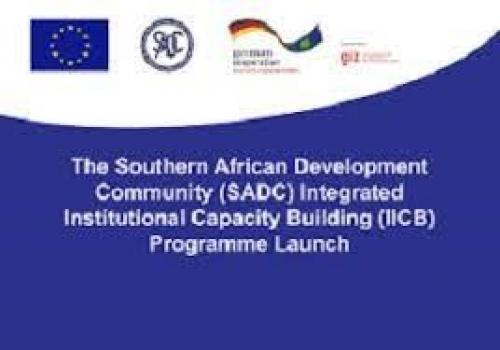The Southern African Development Community (SADC) has stepped up efforts towards regional integration through advancing various programmes with support from its International Cooperating Partners.
One of these programmes is the Integrated Institutional Capacity Building Programme (IICB) for the SADC Secretariat and National Stakeholders.
The IICB (2019-2023) is a €18,7 million programme funded by the European Union (EU) and Germany to increase capacity for the SADC Secretariat to enhance the regional integration agenda.
SADC regional integration seeks to have Member States cooperating and working closely to achieve peace, stability and generate wealth and prosperity for the people of Southern Africa.
IICB is primarily aimed at accelerating progress towards the implementation of the SADC regional integration agenda through strengthening the SADC Secretariat's capacity and Member State structures under two specific objectives.
Specific objective 1
The IICB's specific objective 1, whose end date is 30 July 2022, seeks to enhance the capacity of SADC Member State structures to facilitate and co-ordinate implementation of the regional agenda at country level.
Under this specific objective, 70% of country level implementation of regional priorities has been reported through the SADC Monitoring and Evaluation system.
Seven SADC Member States are implementing the Regional Indicative Strategic Development Plan (RISDP 2020-2030) and priority protocols, out of the eight targeted countries. These are Botswana, Lesotho, Malawi, Mozambique, Namibia, United Republic of Tanzania and Zambia.
Eight out of 15 policy proposals which ensure that gender-mainstreaming principles are developed through the SADC National Structures for the implementation of SADC protocols and strategies have been developed and submitted to the responsible implementation authorities in Member States.
Ongoing projects in all the Member States are expected to yield more in advancing aquatic animal health, industrialisation, gender and science, and technology and innovation.
Seven out of eight Member States, namely Botswana, Eswatini, Lesotho, Malawi, Mozambique, Namibia and Zambia, have put in place functional national level structures and clear operational plans for regional-national linkages. Change project has been developed to establish and strengthen SADC National Committees (SNCs) in the Democratic Republic of Congo and Mauritius.
Seven out of eight countries, Botswana, Eswatini, Lesotho, Mozambique, Namibia, United Republic of Tanzania, and Zambia have reported progress to Council and Summit on the number of SNCs or equivalent reporting progress towards the attainment of regional integration goals to Council and Summit.
Under IICB, at least 35 target group-specific events or publications that demonstrate the benefits of regional integration should have been organised or published by the national coordination structures of the Member States. In this regard, progress shows that 45 out of 35 target group-specific events or publications have been achieved towards meeting this goal.
Four out of eight Member States have achieved 50% capacity to enhance and effectively manage and monitor the implementation of the RISDP 2020-2030 and prioritised protocols at country level, with Botswana, Malawi and Namibia successfully aligning their aquaculture strategies. Zambia has successfully aligned its infrastructure master plan and policy. Projects are currently underway in Mauritius and Mozambique focusing on aquatic animal health. The DRC's alignment of Science Technology and Innovation (STI) Policy to the SADC Protocol on STI and Eswatini alignment of National Development Plan to the RISDP 2020-30 is ongoing.
Eight out of 10 (80%) country level assessments on priority protocol implementation have been conducted. Eight countries -- Botswana, DRC, Lesotho, Malawi, Mauritius, Mozambique, Namibia and Zambia – are implementing resource mobilisation plans to finance regional integration with focus on industrialisation strategies and fisheries/aquaculture strategies, gender and infrastructure.
Specific objective 2
Under the second specific objective, ending 30 March 2023, whose goal is to enhance service delivery by the SADC Secretariat in support of programme/projects planning, co-ordination, resource mobilisation, implementation, monitoring and knowledge-sharing of regional commitments at country level, the IICB is recording notable progress in project management support and in strengthening the capacity of the Secretariat.
IICB is transforming the way of doing business and knowledge management in SADC Secretariat through developing and implementing a change management theory; developing and implementing the SADC knowledge management strategy and system; and training staff in specialised areas towards effective management.
As a result, the Secretariat has is strengthening its internal services level agreements (ISLA) and operational systems and improving its skills and capacity for effective project management. In its effort towards strengthening internal service level agreements, the IICB to date has drafted the ISLA for procurement and work is in progress for Finance and Human Resources. These agreements will improve efficiency, streamline process and ensure greater accountability in the Secretariat. The Secretariat is developing a Change Management Theory, SADC Knowledge Management Strategy and System, and training staff in specialised areas towards effective management. Change Management Theory is a framework of an approach to transitioning people, processes, and resources to achieve better outcomes. Change management theory helps people and organisations focus on the future and make the right decisions to get to that vision.
The Secretariat has set up the governance structure for the IICB project which is now operational, and appointed change champions, a technical working group and a steering committee. Staff engagement and mobilisation meetings have been held, while change and knowledge management readiness survey/baseline has been conducted.

